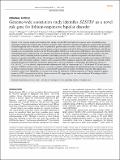| dc.contributor.author | Song, J | en_US |
| dc.contributor.author | Bergen, S E | en_US |
| dc.contributor.author | Di Florio, A | en_US |
| dc.contributor.author | Karlsson, R | en_US |
| dc.contributor.author | Charney, A | en_US |
| dc.contributor.author | Ruderfer, D M | en_US |
| dc.contributor.author | Stahl, E A | en_US |
| dc.contributor.author | Chambert, K D | en_US |
| dc.contributor.author | Moran, J L | en_US |
| dc.contributor.author | Gordon-Smith, K | en_US |
| dc.contributor.author | Forty, L | en_US |
| dc.contributor.author | Green, E K | en_US |
| dc.contributor.author | Jones, I | en_US |
| dc.contributor.author | Jones, L | en_US |
| dc.contributor.author | Scolnick, E M | en_US |
| dc.contributor.author | Sklar, P | en_US |
| dc.contributor.author | Smoller, J W | en_US |
| dc.contributor.author | Lichtenstein, P | en_US |
| dc.contributor.author | Hultman, C | en_US |
| dc.contributor.author | Craddock, N | en_US |
| dc.contributor.author | Landén, M | en_US |
| dc.contributor.author | Smoller, Jordan W | en_US |
| dc.contributor.author | Perlis, Roy H | en_US |
| dc.contributor.author | Lee, Phil Hyoun | en_US |
| dc.contributor.author | Castro, Victor M | en_US |
| dc.contributor.author | Hoffnagle, Alison G | en_US |
| dc.contributor.author | Sklar, Pamela | en_US |
| dc.contributor.author | Stahl, Eli A | en_US |
| dc.contributor.author | Purcell, Shaun M | en_US |
| dc.contributor.author | Ruderfer, Douglas M | en_US |
| dc.contributor.author | Charney, Alexander W | en_US |
| dc.contributor.author | Roussos, Panos | en_US |
| dc.contributor.author | Michele Pato, Carlos Pato | en_US |
| dc.contributor.author | Medeiros, Helen | en_US |
| dc.contributor.author | Sobel, Janet | en_US |
| dc.contributor.author | Craddock, Nick | en_US |
| dc.contributor.author | Jones, Ian | en_US |
| dc.contributor.author | Forty, Liz | en_US |
| dc.contributor.author | Florio, Arianna Di | en_US |
| dc.contributor.author | Green, Elaine | en_US |
| dc.contributor.author | Jones, Lisa | en_US |
| dc.contributor.author | Gordon-Smith, Katherine | en_US |
| dc.contributor.author | Landen, Mikael | en_US |
| dc.contributor.author | Hultman, Christina | en_US |
| dc.contributor.author | Jureus, Anders | en_US |
| dc.contributor.author | Bergen, Sarah | en_US |
| dc.contributor.author | McCarroll, Steven | en_US |
| dc.contributor.author | Moran, Jennifer | en_US |
| dc.contributor.author | Chambert, Kimberly | en_US |
| dc.contributor.author | Belliveau, Richard A | en_US |
| dc.date.accessioned | 2016-11-18T20:04:38Z | |
| dc.date.issued | 2016 | en_US |
| dc.identifier.citation | Song, J., S. E. Bergen, A. Di Florio, R. Karlsson, A. Charney, D. M. Ruderfer, E. A. Stahl, et al. 2016. “Genome-wide association study identifies SESTD1 as a novel risk gene for lithium-responsive bipolar disorder.” Molecular Psychiatry 21 (9): 1290-1297. doi:10.1038/mp.2015.165. http://dx.doi.org/10.1038/mp.2015.165. | en |
| dc.identifier.issn | 1359-4184 | en |
| dc.identifier.uri | http://nrs.harvard.edu/urn-3:HUL.InstRepos:29407537 | |
| dc.description.abstract | Lithium is the mainstay prophylactic treatment for bipolar disorder (BD), but treatment response varies considerably across individuals. Patients who respond well to lithium treatment might represent a relatively homogeneous subtype of this genetically and phenotypically diverse disorder. Here, we performed genome-wide association studies (GWAS) to identify (i) specific genetic variations influencing lithium response and (ii) genetic variants associated with risk for lithium-responsive BD. Patients with BD and controls were recruited from Sweden and the United Kingdom. GWAS were performed on 2698 patients with subjectively defined (self-reported) lithium response and 1176 patients with objectively defined (clinically documented) lithium response. We next conducted GWAS comparing lithium responders with healthy controls (1639 subjective responders and 8899 controls; 323 objective responders and 6684 controls). Meta-analyses of Swedish and UK results revealed no significant associations with lithium response within the bipolar subjects. However, when comparing lithium-responsive patients with controls, two imputed markers attained genome-wide significant associations, among which one was validated in confirmatory genotyping (rs116323614, P=2.74 × 10−8). It is an intronic single-nucleotide polymorphism (SNP) on chromosome 2q31.2 in the gene SEC14 and spectrin domains 1 (SESTD1), which encodes a protein involved in regulation of phospholipids. Phospholipids have been strongly implicated as lithium treatment targets. Furthermore, we estimated the proportion of variance for lithium-responsive BD explained by common variants (‘SNP heritability') as 0.25 and 0.29 using two definitions of lithium response. Our results revealed a genetic variant in SESTD1 associated with risk for lithium-responsive BD, suggesting that the understanding of BD etiology could be furthered by focusing on this subtype of BD. | en |
| dc.language.iso | en_US | en |
| dc.publisher | Nature Publishing Group | en |
| dc.relation.isversionof | doi:10.1038/mp.2015.165 | en |
| dc.relation.hasversion | http://www.ncbi.nlm.nih.gov/pmc/articles/PMC4995544/pdf/ | en |
| dash.license | LAA | en_US |
| dc.title | Genome-wide association study identifies SESTD1 as a novel risk gene for lithium-responsive bipolar disorder | en |
| dc.type | Journal Article | en_US |
| dc.description.version | Version of Record | en |
| dc.relation.journal | Molecular Psychiatry | en |
| dc.date.available | 2016-11-18T20:04:38Z | |
| dc.identifier.doi | 10.1038/mp.2015.165 | * |
| dash.authorsordered | false | |


